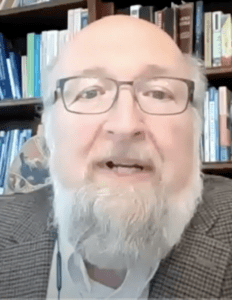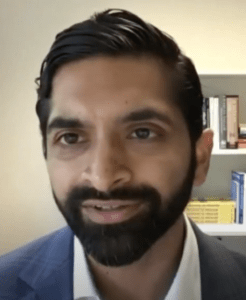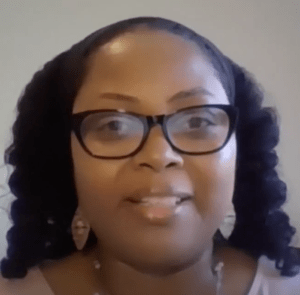The rapid and creative responses churches made to address the COVID-19 pandemic created significant stresses on church leadership and laity both, one of the nation’s leading religion researchers said in a recent webinar.
“The staggering amount of change that (occurred in) most U.S. congregations during the pandemic, even if they were doing positive adaptations, has been anxiety producing, certainly for the clergy and, I think lay members, to a pretty monumental degree,” said Scott Thumma, director of the Hartford Institute for Religion Research.

Scott Thumma
Thumma was one of four expert panelists who responded to research presented in “Mental Health in Religious Communities During the COVID-19 Pandemic,” an online forum presented by the Institute for Human Ecology at The Catholic University of America.
The study, which was conducted by Brandon Vaidyanathan through Catholic University of America, queried 1,600 Americans from a variety of faiths and Christian denominations in late 2020, found a strong correlation between religiosity and mental health. It also found that religious participation and identification increased during the pandemic and that persons of faith are less likely to view mental illness as a stigma, said webinar moderator and sociologist Brandon Vaidyanathan, a fellow with the institute.
These findings speak to the highly adaptive behaviors of faith communities barred from in-person gatherings or other restrictions and also demonstrate the central role religion has played in buffering against the negative stressors of the pandemic, Thumma said.
The research found a strong sense of optimism in response to the pandemic, with some ministers expressing encouragement about the church’s quick pivot into online and other innovative ministries.
But there’s a price to be paid for that success, Thumma said, noting that he’s heard from clergy who are on the verge of burnout from all the extra effort that was required to institute those changes and maintain them for months.
“Congregational leadership and lay leadership are never stress-free, but this has become simultaneously a moment of compulsory innovation and a moment of great fatigue from all the change,” he reported.

Brandon Vaidyanathan
The study asked respondents in Texas and in the District of Columbia and Maryland vicinity how the pandemic affected their own mental health and overall flourishing, and that of their faith communities. Those surveyed included Catholics, Jews, evangelical Christians, African American Baptists and Hindus.
Also examined was religiosity, which includes the sense of closeness to faith communities, the frequency of attendance, prayer, meditation and Scripture reading and how important religion is in everyday life.
Nationwide, the reported incidence of mental health problems increased to one-fourth of the population during the pandemic, compared to one-fifth before the pandemic, Vaidyanathan said.
It now appears that the innovations of virtual worship and other spiritual gatherings helped many find solace despite being physically separated from their houses of worship, thus mitigating some of the potential increases in mental health problems.
Even so, pastors and churches did not do as much as some expected to address mental health explicitly.
Only about 50% of respondents “said their faith leaders have talked about mental health at all, and significantly fewer say the faith community has provided external resources for mental health or promoted online support groups for mental health,” he reported. And faith communities where leaders provided online support groups seem to have done better in terms of mental health.
When asked who they would call first during a mental health crisis, only 2% of respondents said it would be a faith leader.
When asked who they would call first during a mental health crisis, only 2% of respondents said it would be a faith leader.
Nevertheless, the mental health challenges brought on by the pandemic inspired some to establish ties with communities of faith or to increase participation, Vaidyanathan said. “It seems that the stresses of the pandemic may be driving them toward religious participation and therefore this new mode of online participation is a benefit for this (group) of people.”
Those who reported a decline in mental health during the pandemic were mostly respondents for whom faith was less than an essential ingredient of daily life, he added. But that percentage was relatively low. “Overall, only 20% of our sample said mental health has worsened.”
And 60% of those whose mental health deteriorated identified feelings of isolation as the source of their decline, he said. “Those who report a decline in religiosity since the pandemic have more than twice the odds of feeling isolated and lonely.”
Evangelicals and Black Baptists were among those who consistently rated their psychological conditions the highest.
African Americans in particular were among those who reported a willingness to share with fellow church members about their feelings, Vaidyanathan said. “Sharing problems with other members of the community is a vital ingredient of mental health and flourishing.”

Elisa Gilmore
Panelist Elisa Gilmore, a deaconess at First Baptist Church of Glenarden, Md., offered an explanation for why Black Christians are predisposed to openness within the church: “If I would have to sum it up, it’s because it’s a safe place.”
It should be no surprise that most African Americans do not trust government agencies, police officers, doctors or even teachers but usually have confidence in their faith communities, she said.
“Additionally, due to the systemic racism and oppression that has occurred since slavery, the Black church has been that safe haven for those experiencing challenges and trauma,” she added. Churches are “where people of color would go for healing prayers and support and share where they know it will not be held against them.”
Gilmore said her congregation long has offered ministries to help its members struggling with cancer, Alzheimer’s disease, sexual and substance abuse, domestic violence, teen parenting and other challenges. Even before COVID-19, it provided a mental health ministry.
“The goal is to remove the stigma and to stress to clergy and other churches that mental illness is not due to a lack of faith, or a character flaw, and that not everything can be prayed away or demonized,” she said.

Lisa Ziv
Panelist Liza Ziv, interim executive director for the Blue Dove Foundation, a Jewish mental health resources nonprofit, said she welcomed the study’s finding that those with mental health issues are decreasingly stigmatized.
“One of the biggest silver linings of COVID — it’s both a blessing and a curse — is that mental health is now part of the everyday conversation. Mental health used to be like cancer was a decade or so ago when they wouldn’t even say the word out loud … . Mental health is now out of the shadows to some degree.”
As a psychologist who studies religion, panelist Mark McMinn said he was pleasantly heartened to learn how many respondents said they confide in fellow church members about mental health struggles, even though it wasn’t a high percentage.
“In a society that is dominated by an individualist kind of mindset, it’s not too surprising to me that’s a low percentage, and I was glad to see there was 30%,” said McMinn, a scholar in residence at George Fox University in Newberg, Ore.
Related articles:
Clergy mental health is a choice between life and death | Opinion by Jakob Topper
Coronavirus presents a challenge to mental health as well
Barna advice to pastors: Talk honestly about emotions and relationships


